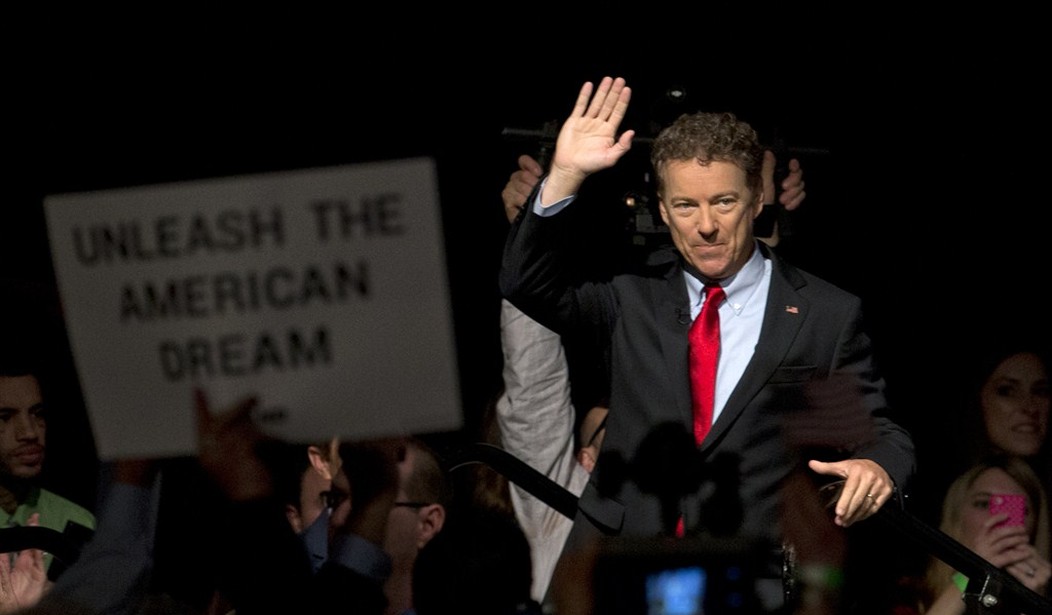Rand Paul is the Republican son of a longtime Republican House member, but let it never be said that he is not open-minded. In 2013, he confided to Sean Hannity, "I've been kind of disappointed, because honestly there were certain aspects of President Obama that I wanted to like."
I know how he feels. That's how I feel about Rand Paul.
My old friend David Boaz, author of the excellent new book "The Libertarian Mind," told NPR that Paul is "the most libertarian major presidential candidate that I can remember seeing." I'm a more moderate libertarian than Boaz -- or a squishier one -- but my general framework is the same. I have a strong preference for free markets, civil liberties, personal autonomy, limited government and a foreign policy of restraint.
I've voted for several Libertarian presidential candidates. The biggest single influence on my policy views is Milton Friedman. I absorbed Friedrich Hayek and Ayn Rand in college. My columns appear regularly on the website of Reason, the nation's premier libertarian publication.
So I should not be a tough sell for Paul. He sounds pretty libertarian when he says, in reference to the National Security Agency, "the phone records of law-abiding citizens are none of their damn business." He shows a refreshing open-mindedness on criminal justice by envisioning an America where "any law that disproportionately incarcerates people of color is repealed."
He stands out from most Republicans in not making U.S. military intervention the default option. He accuses 2008 presidential nominee John McCain of wanting "15 wars more." He dared to tell a Faith and Freedom Coalition audience, "I can recall no utterance of Jesus in favor of war or any acts of aggression."
But Paul sometimes sounds anything but libertarian. He rejects same-sex marriage, which he attributes to a "moral crisis." He denounced the DREAM Act, which offered citizenship to some young foreigners brought here without authorization as children, as "the Washington elitists' roundabout way of giving amnesty to illegal immigrant students." And sometimes he pushes his libertarian principles too far, as when he took issue with the 1964 Civil Rights Act.
Recommended
Paul rarely fails to balance his commendable pronouncements with lamentable ones. No sooner did he portray Jesus as peace-loving than he accused "liberal elites" of waging "war on Christianity."
In his Tuesday speech announcing his presidential candidacy, he pandered to anti-Muslim sentiment by insisting that "until we name the enemy, we can't win the war. The enemy is radical Islam." But the administration that allegedly declines to properly identify the enemy is the very one that killed Osama bin Laden and thousands of alleged terrorists.
On global warming, Paul resides in the "see no evil" camp, discounting the evidence and opposing EPA regulation of greenhouse gases. He depicted the federal debt as "tripling under Barack Obama's watch." In reality, the gross debt has grown by about 70 percent since he took office, and the publicly held debt has doubled.
Paul's casual regard for facts is an admission that the truth does not adequately vindicate his views. It also reflects a tendency, common to the fervent ideologues, of ignoring evidence that undermines cherished beliefs.
There is nothing wrong with adopting a broad outlook that incorporates certain basic principles for their inherent value or practical utility. Ideology can be a useful framework for making sense of how the world works.
The trouble comes when it hardens into dogma. Wisdom requires a continual willingness to question one's assumptions in light of new information. The alternative is what Karl Rove celebrated when he mocked a White House colleague for being "in what we call the reality-based community," which Rove says is made up of those who imagine that "solutions emerge from your judicious study of discernible reality."
Paul has never given the impression that his convictions are susceptible to refutation. He comes across not as someone whose judicious study of discernible reality led him to his political philosophy, but as someone who first found a political philosophy and then learned only enough to confirm his chosen views.
Some Republican legislators are known for their mastery of policy substance, like Rep. Paul Ryan of Wisconsin, Sen. Mark Kirk of Illinois and Sen. Rob Portman of Ohio. Paul is not one of them. In the presidency, wisdom and knowledge are helpful.
As Paul said of Obama, I'd like to be able to like him. But he doesn't make it easy.

























Join the conversation as a VIP Member